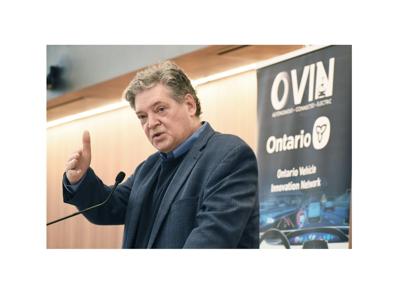A former General Motors executive is putting the pedal to the metal as Ontario's new representative to Washington, D.C., helping the province on the road of "accelerated industrial renewal" sparked by two new electric vehicle battery plants.
"This is not one and done," David Paterson says of the massive Volkswagen and Stellantis EV factories under construction in St. Thomas and Windsor thanks to federal and provincial subsidies that matched American incentives and kept the plants from going to the United States.
"It's an ongoing transformation."
His assignment: create jobs at home by convincing more American businesses to set up shop here, while keeping a close watch on current trade issues and protecting provincial interests in the lead-up to the 2026 renegotiations of the USMCA free trade pact between the U.S., Mexico and Canada.
And there is the added drama of a U.S. presidential election this year with Donald Trump attempting a comeback.
"We'll leave the political decisions to American voters," Paterson says, noting he was on the scene for the last USMCA negotiations during the Trump administration.
"I had a front-row seat being in the auto sector, because probably 90 per cent of the agreement was automotive supply chain-related."
You might be interested in
Beyond auto, the fast-paced world of business and technology includes rapid advancements in medical sciences, artificial intelligence and other fields that require a nimble approach to connect investors in the U.S. to research, expertise and markets in Ontario, the third-largest trading partner to the U.S. behind Mexico and China.
Appointed to the three-year posting in November, Paterson, 64, was fresh from retiring as GM Canada's vice-president of corporate and environmental affairs last June — and a Yukon canoe trip with old friends dating to elementary school — when Economic Development Minister Vic Fedeli got in touch.
Paterson, whose CV includes senior roles at BlackBerry and Manulife, had previously made a courtesy phone call to Fedeli, letting him know he was leaving the automaker after an eventful decade that saw its massive Oshawa plant shut down and later spring back to life following a nudge from Unifor and the Ingersoll plant transformed for EV production.
"I wished him well and got thinking shortly after that, I didn't ask him, 'What are you going to be doing?' I just figured retirement meant retirement," Fedeli recalls.
"So I called him back and said, 'Hey, I don't know what your plans are, but if you're interested in public service, we've got a real challenge here."
Challenge accepted.
"I'm itching to get there," Paterson says in Toronto as he works on security and other clearances needed for the move to Washington, where he is arranging a place to live.
His predecessor in the $350,000-a-year job operating out of the Canadian embassy was Ian Todd, a former campaign adviser to Premier Doug Ford whose term ended in fall 2021, leaving a two-year gap that was covered by the province's small staff at the embassy and from Fedeli's Toronto office.
The move away from a traditional patronage appointment was intentional, Fedeli said, calling provincial trade representative postings in Washington and other U.S. and international cities "sales offices."
The Progressive Conservative government faced controversy over such patronage appointments in its first term, including a 26-year-old as agent general in New York who played university lacrosse with the son of former Ford chief-of-staff Dean French. French resigned over the nepotism scandal that included appointing his wife's cousin to a similar post in London.
"They're sales driven, not really diplomatic postings … we want hardcore sales to happen," says Fedeli.
With seasoning in the tech and financial industries from his years at BlackBerry and Manulife, Paterson says he's familiar with the Washington scene and has a solid list of contacts.
"It's a relationship business," he adds, noting his plan is to reach out to governors and senators from U.S. states with strong links to Ontario to build on the existing trade relationships that total $450 billion a year between the two countries.
In a separate interview, Fedeli says he frequently reminds American officials that "nine million Americans wake up every morning to make products to ship to Canada" — which makes minimizing trade barriers equally important to both countries.
Maintaining a watchful eye on any protectionist "Buy American" pushes in the U.S. and the coming USMCA talks is also crucial for "fair treatment" of the auto, agricultural, lumber and other industries so important to Ontario's economy, Fedeli adds.
"All these things are always under siege by the U.S."













Anyone can read Conversations, but to contribute, you should be a registered Torstar account holder. If you do not yet have a Torstar account, you can create one now (it is free).
To join the conversation set a first and last name in your user profile.
Sign in or register for free to join the Conversation